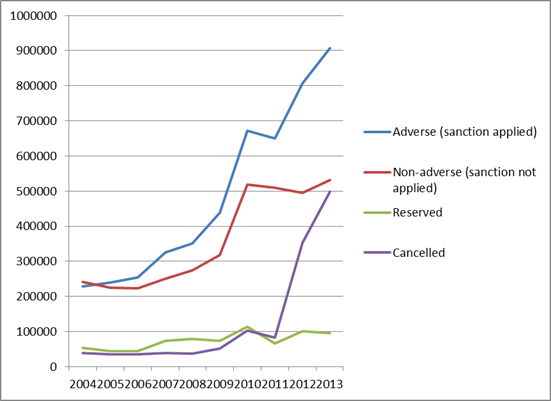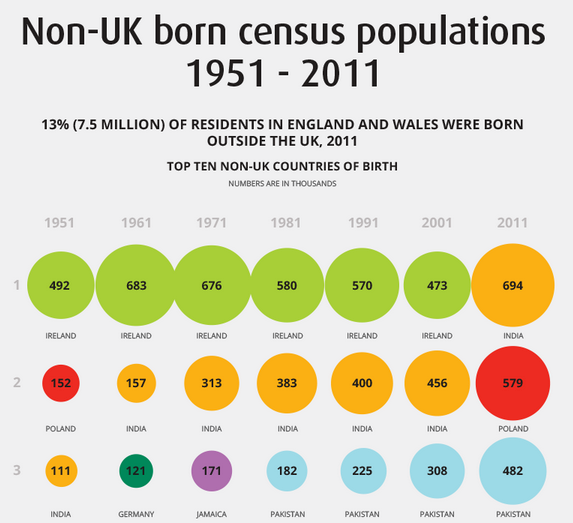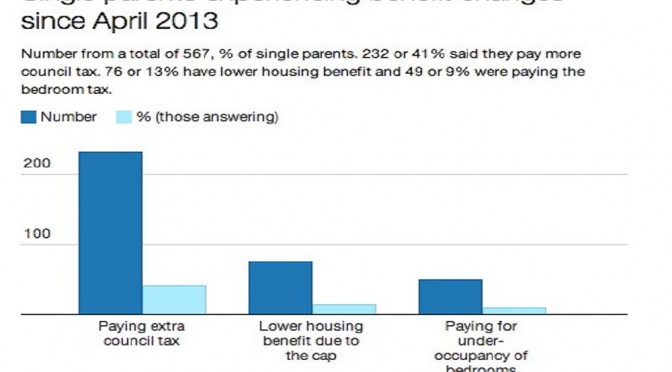 |
| Sanction referrals 2003 – 2013. Data compiled from DWP Stat-Xplore website |
There has been a dramatic rise in the number of sanctions against unemployed people over the past decade.
The figures, from data compiled from the DWP’s (Department of Work and Pensions) Stat-Xplore website show over 900,000 sanctions were issued in 2013, more than double the number applied in 2009 and almost four times the figure for 2004.
The decision to cut off a claimant’s benefits is called an ‘adverse’ decision by the DWP.
Each case is referred to a ‘decision maker‘ who decides whether a sanction should be applied or not.
‘Non-adverse’ decisions, where a person’s case was referred but it was decided not to apply a sanction, rose sharply in 2009 – 2010, by just over 200,000.
These cases have hovered around the half a million mark since 2010.
‘Reserved’ referrals, where the decision maker says a sanction should be applied, but where there is no current claim, have almost doubled from 53,026 in 2004 to 99,964 in 2012. There was a small drop in the number of these cases in 2013 to 95,087.
Cancelled sanction referrals have rocketed
‘Cancelled’ referrals have rocketed. In 2013 there were more than twelve times the number in 2004.
Most of this rise has occurred during the past few years. The number of cancelled referrals in 2013 is almost five times that in 2010.
The DWP define a ‘cancelled’ referral as one which:
“results in no sanction decision being made. This can occur in specific circumstances for example, the sanction referral has been made in error, the claimant stops claiming before they actually committed the sanctionable failure, or information requested by the Decision Maker was not made available within a specific time period.”
The DWP were asked to explain the increase in ‘cancelled’ decisions over the past few years but did not give a reason.
Dr David Webster, Honorary Senior Research Fellow at the University of Glasgow, has done extensive research into sanctions. He said there has been no significant increase in cancellations of referrals by DWP’s own staff, but instead could be related to outsourcing practices.
“The rise in cancelled sanction referrals is almost entirely due to sanctions initiated by contractors, in the Work Programme and some other programmes such as Mandatory Work Activity and Work Experience.”
Dr Webster believes there are two reasons for the rise in cancelled referrals from contractors: mistakes made in paperwork submitted to the DWP; and that the DWP do not allow contractors to use their judgement when referring people for a sanction.
“Contractors are obliged to refer a claimant for sanction if they fail to meet any requirement at all, such as missing a single interview, even if the contractor well knows that there is a good reason.”
This means that even if a person on the Work Programme has informed the relevant people they have a hospital appointment or a funeral and won’t be able to make an appointment, they will still be referred for a sanction.
A DWP spokesman said:
“Sanctions are only used as a last resort in a small percentage of cases and our built-in safeguards allow for sanctions to be cancelled where necessary.
“In these cases claimants will not lose out on their benefit payment”.
A version of this article was originally posted on NatalieLeal.blogspot.co.uk



